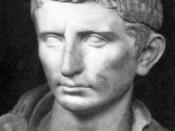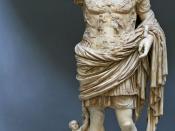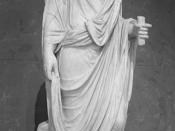ROMAN RELIGION
AUGUSTUS AND EMPEROR WORSHIP
Augustus carried out various measures to revive traditional religion, but was careful to avoid the semblance of a dictator or tyrant. The very title 'Augustus' had religious connotations, meaning 'a person in whom numen was increased.' The concept of the ruler as a god, however, was new to Rome. Although statues of leaders were made during the republic, they were not regarded as gods. Julius Caesar set the precedent for emperor worship in Rome, and probably started a cult of himself. A statue was set up in a temple with the inscription: 'To the unconquered god.' It was decreed by senate that he have a house like a temple and a priest. He was also deified after his assassination: 'He died at the age of 55 and was declared a god" (Suetonius).
Augustus had to be careful to avoid the errors of Julius Caesar and the resentment that he had engendered be claiming to be divine during his own lifetime.
He called himself a 'son of a god'--- 'divi filius', but did not accept deification in his lifetime.) He did, however, capitalize on Julius Caesar's claim of descent from the gods). After Augustus, however, other emperors accepted or sought worship in their own lifetimes e.g. Nero and Domitian
Process by which a Roman Emperor became a god:
Claim to divine descent
Statues eg those of Augustus were adjacent to statues of gods
Images of the genius of Augustus were placed next to those of the Lares( household spirits) at crossroads. The genius received honours
Being honoured by poets---- Horace and Virgil praised Rome and linked Augustus to the gods: 'son of the Deified.' (Aeneid). They also reinforced the idea that he would be made a god on his death
A libation was offered to...


